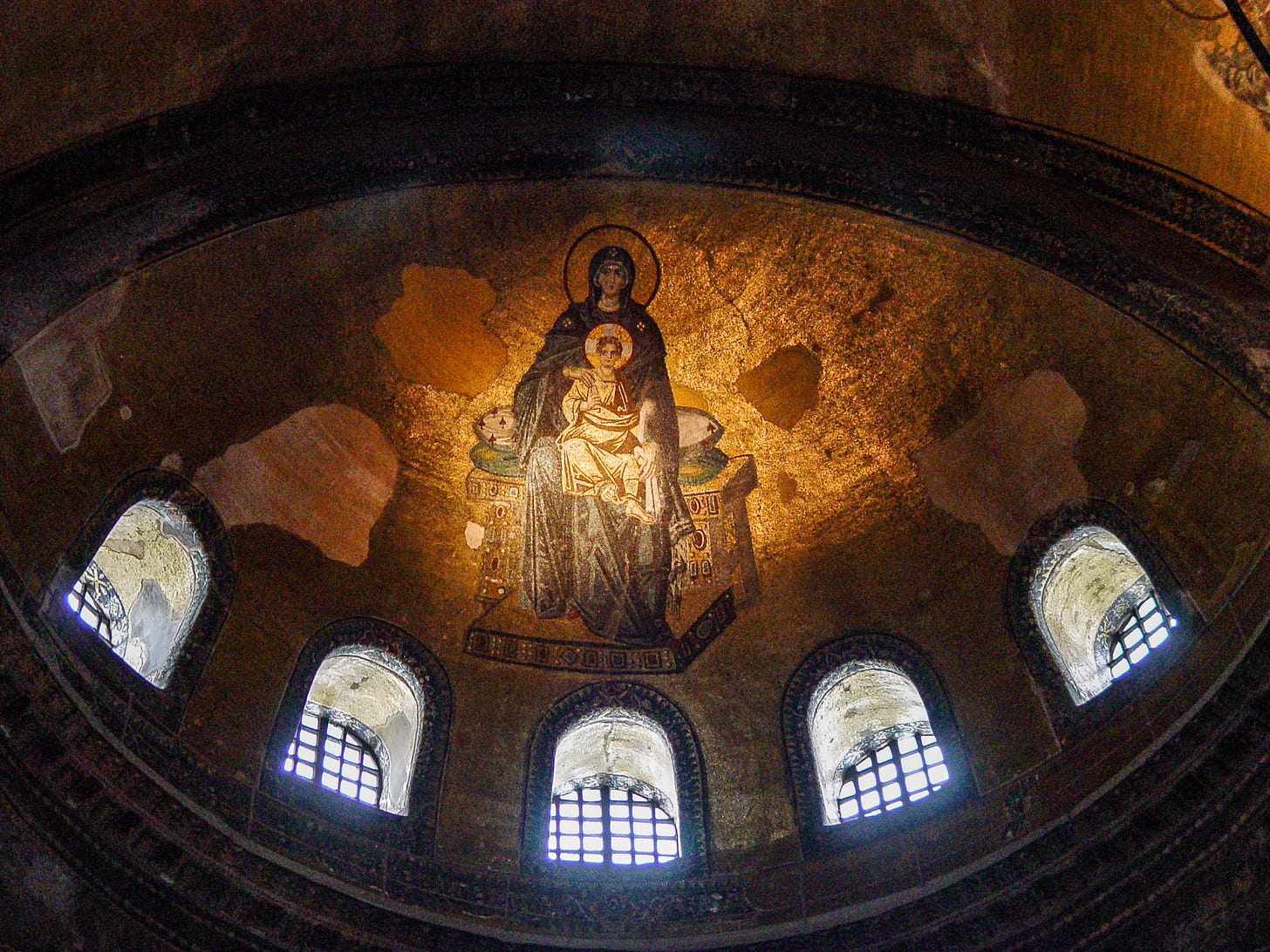Faith Has Been the Primary Driver of Every Person's Choices Throughout the Ages | It is no Different in the Present Age | Always, the Difference is in What or Whom Such Faith is Placed
C.S. Lewis's "Mere Christianity" is still — and perhaps even more — relevant in this divided and increasingly secular era as a rational starting point for exploration of faith, of all kinds.
Introduction: From Christian cathedral, to mosque, to museum, and now again, a mosque. Originally built in the 4th century AD, the Hagia Sophia in Istanbul, began its 1600+ years of existence, described as the world’s largest cathedral. The current building, on the original site, is mid 6th century AD. The changing fortunes of this world worship icon is an excellent example of the shifting sands of politics, and faith. Borders and denominations have undergone massive transformations in the more than 1.5 millennia of this place. Even as the world changes, one thing does not and will not change in the faith arena — no matter what is happening politically, or culturally — everyone builds their life choices around a faith of some kind. Whether one is Christian, or of some other persuasion, C.S. Lewis’s post-WW2 book (and radio series)1 offers a reasonable and practical beginning for both interfaith dialogue and understanding one’s own faith.

The Relevance of Mere Christianity in a World of Declining Churches and Rising Secularism
C.S. Lewis’s Mere Christianity, first published in 1952, is considered a classic of Christian apologetics, offering a reasoned and accessible defense of the Christian faith. As modern society sees an apparent decline in religious adherence, and most certainly in church attendance, there is a parallel rise in unchurched spirituality, secularism, irreligion, and atheism.2
Still, faith of one kind or another is still a determinant of behavior. For those exploring their faith choices, the relevance of Mere Christianity has not diminished.
Instead, the book’s timeless arguments and approach to faith, address many of the questions and challenges posed by today’s increasingly secular worldview.
Mere Christianity continues to resonate, offering a bridge between faith and reason, addressing the moral vacuum left by declining religious influence, and providing a framework for a deeper understanding of spirituality in a skeptical age.
Faith and Reason: A Rational Defense of Belief
One of the enduring strengths of Mere Christianity is Lewis's ability to engage both believers and skeptics on the level of reason. In an era where atheism often positions itself as the rational alternative to religious "superstition," Lewis's work remains a compelling reminder that faith and reason are not mutually exclusive. He uses logical arguments to build his case for Christianity, starting with the moral law — the innate sense of right and wrong that he argues points to a moral lawgiver, or God. This appeal to a universal human experience provides a starting point for conversations about faith that transcend cultural and religious boundaries.
In a world where many turn to science as the ultimate arbiter of truth, Lewis does not reject scientific discovery but instead situates it within a larger metaphysical framework. His argument that science explains how the universe works but not why it exists or what gives it meaning remains pertinent in discussions between theists and atheists. Lewis invites readers to consider the possibility that Christianity offers answers to existential questions that science cannot address, encouraging a more holistic view of truth.
Addressing the Moral Vacuum
As religion's influence wanes in many societies, questions arise about the foundation of morality. Without a shared religious framework, societies often grapple with establishing a cohesive moral code. Lewis’s Mere Christianity is particularly relevant in addressing this challenge. His argument that moral values require a transcendent source resonates in a world where moral relativism can lead to fragmentation and confusion.
Lewis contends that without an objective standard — something beyond human opinion — moral judgments lose their grounding. This perspective challenges the notion that morality can be entirely subjective or culturally constructed, offering a critique of secular ethical systems that rely solely on human consensus. In this way, Mere Christianity continues to speak to contemporary debates about the basis of ethics, providing a counterpoint to the often individualistic and relativistic approaches prevalent today.
Bridging Divides in a Polarized World
Another notable aspect of Mere Christianity is its ecumenical approach. Lewis focuses on the core beliefs shared by Christians of all denominations, deliberately avoiding contentious doctrinal issues. This "mere" Christianity is particularly valuable in a world marked by division — not only between religious and secular perspectives but also within Christian communities. By emphasizing shared values and beliefs, Lewis offers a model for dialogue that prioritizes unity over division, making his work a resource for fostering understanding in both interfaith and intrafaith contexts.
For atheists and skeptics, Mere Christianity serves as an invitation rather than a confrontation. Lewis’s tone is conversational and respectful, avoiding dogmatism or hostility. This approach is critical in a polarized world where debates about religion can often devolve into acrimony. By presenting Christianity as a reasonable and coherent worldview rather than a series of rigid rules, Lewis opens the door for meaningful engagement.
Spiritual Hunger in a Secular Age
Despite the rise of atheism, many people today experience a profound sense of spiritual longing. The decline of traditional religion has not eradicated questions about purpose, meaning, and identity. Lewis’s exploration of human desires — particularly his argument that our longing for something beyond this world suggests the existence of God — speaks directly to this spiritual hunger. He writes, “If I find in myself a desire which no experience in this world can satisfy, the most probable explanation is that I was made for another world.” This insight continues to resonate with those who feel disenchanted by materialism and are searching for a deeper sense of fulfillment.
Conclusion
In a world where religious adherence is in decline and atheism is on the rise, C.S. Lewis's Mere Christianity remains profoundly relevant. Its rational defense of Christianity challenges the assumption that faith and reason are incompatible, while its insights into morality and human nature address some of the most pressing questions of the modern age. Moreover, Lewis’s respectful and inclusive approach to faith makes his work accessible to believers and skeptics alike, offering a bridge for dialogue in a divided and skeptical world. As society continues to grapple with questions of meaning, morality, and purpose, Mere Christianity provides a timeless resource for exploring these enduring issues.


















Mere Christianity, by Clive Staples Lewis, was adapted from a series of BBC radio talks made between 1941 and 1944, originally published as three separate volumes: Broadcast Talks, Christian Behaviour, and Beyond Personality. It first appeared in book form in the United Kingdom in 1952 by publisher, Geoffrey Bles.
Note: according to the Pew Research data, only about 4% of Americans describe themselves as atheists, but that figure has doubled in the past 15 years, along with a similar increase in self-described agnostics. Those describing themselves as “no particular religion” is now about 20% of US adults, double what it was 15 years ago. (See Pew Research: https://www.pewresearch.org/religion/2019/10/17/in-u-s-decline-of-christianity-continues-at-rapid-pace).
See also: “Decline of Christianity in the Western world.” A decline of Christian affiliation in the Western world has been observed in the decades since the end of World War II. While most countries in the Western world were historically almost exclusively Christian, the post-World War II era has seen developed countries with modern, secular educational facilities shifting towards post-Christian, secular, globalized, multicultural and multi-faith societies. While Christianity is currently the predominant religion in Latin America, Europe, Canada and the United States, the religion is declining in many of these areas, particularly in Western Europe, North America, and Australia and New Zealand. A decline in Christianity among countries in Latin America's Southern Cone has also contributed to a rise in irreligion in Latin America. In the West, since at least the mid-twentieth century there has been a gradual decline in adherence to established Christianity. In a process described as secularization, "unchurched spirituality" is gaining more prominence over organized religion. (Sourced from Wikipedia and selections from the 136 documented references.)








